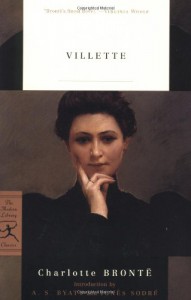Villette
 According to The Telegraph Charlotte Brontë’s Villette is better than her best known work [b:Jane Eyre|10210|Jane Eyre|Charlotte Brontë|https://d.gr-assets.com/books/1327867269s/10210.jpg|2977639]. This bold declaration alone put Villette in my reading list because Jane Eyre really is one of the best books I ever had the pleasure of reading. Having just read Villette I have to disagree with the Telegraph’s columnist, I should have known better, goddam hyperboles. Villette is a fictional city in France, the novel is somewhat autobiographical in that it is partly based on Brontë’s experience as a teacher in Brussels.
According to The Telegraph Charlotte Brontë’s Villette is better than her best known work [b:Jane Eyre|10210|Jane Eyre|Charlotte Brontë|https://d.gr-assets.com/books/1327867269s/10210.jpg|2977639]. This bold declaration alone put Villette in my reading list because Jane Eyre really is one of the best books I ever had the pleasure of reading. Having just read Villette I have to disagree with the Telegraph’s columnist, I should have known better, goddam hyperboles. Villette is a fictional city in France, the novel is somewhat autobiographical in that it is partly based on Brontë’s experience as a teacher in Brussels. Villette’s protagonist is one Lucy Snowe, a plain, quiet and often rather timid lady who generally avoids speaking her mind unless completely provoked. For the first half of the book Lucy seems like a secondary character in her own story while she narrates her experiences in the home of her godmother Mrs. Bretton. This early section of the book is very charming but Lucy is more of an observer than a central character that drives the story.
After leaving the Bretton’s house Lucy works for a while as a caregiver for an old lady who dies after teaching Lucy some life lessons. Lucy's next move is to try her luck in France in a city called Villette where she is informed that the prospects are good for someone in her position. Her arrival in France starts with an initial adventure of a “fish out of water” variety. Her initial troubles in France are mostly due to her inability to speak French. She eventually finds an occupation as an English teacher in a school where she develops a crush on a nice doctor, quickly retreats when he falls in love with somebody else, then starts a sort of “will they / won’t they” relationship with an eccentric professor of French literature.
For most of the book there seems to be no clear plot trajectory as the storyline seems to become aimlessly episodic. It was not too much of a hardship to read through though as Ms. Brontë wrote with considerable grace and charms, as with Jane Eyre her prose is a thing of beauty. My main complaint with Villette is the inclusion of many French dialogues, the meaning of which I can not infer from the context. It is ironic that Lucy initially complains of a “storm of French” when she is addressed in that language which she does not have a command of. Later on as she picks up the language she seems to speak it like a pro and leave this hapless reader behind with the storms of French from several characters as well as herself.
The story itself is not nearly as exciting or dramatic as Jane Eyre. There is no mad woman in the attic to speak of, though there is a touch of gothic spookiness in the story. The writing is of course exquisite and the characters are all vivid and believable. While the tone of the novel is mostly cheerful or hopeful, there is always an underlying feeling of sadness and loneliness in Lucy’s narrative. There is also some surprisingly profound examination of the differences between Protestantism and Catholicism, the latter of which Ms. Brontë was definitely not a fan. The ending can be described as WTF and it made me feel kind of exasperated, but I have since read several articles concerning this “controversial” ending and I have to concede that it is quite clever and original. I am still not terribly keen on it though.
I guess you could say I am somewhat disappointed in Villete as I have been led by the goddam Telegraph to expect something awe inspiring like Jane Eyre. Having said that, it is still a good book; beautifully written, funny and sad in places. I can certainly recommend it if you are looking for a nice Victorian novel to read and you like Brontë’s style of writing (which you should). If, like me, your command of French begins and ends with “bonjour” you may want to have a French - English dictionary within reach, or make use of Google Translation which is very useful but occasionally comes up with some hilariously nonsensical results.



